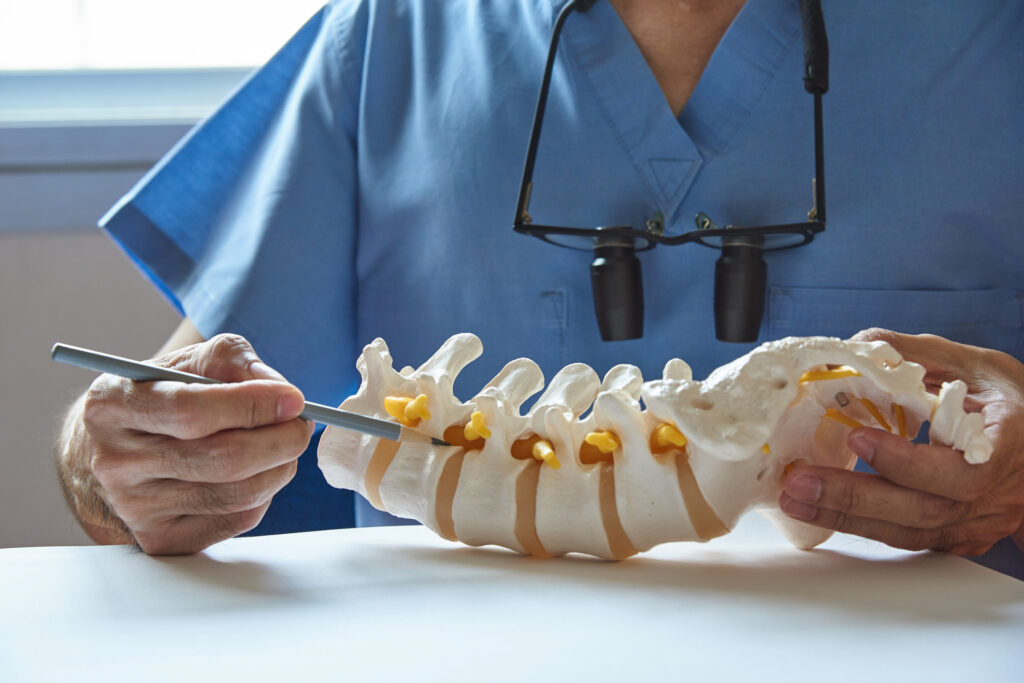Spinal stenosis and disc degeneration are often painful conditions that can disrupt a person’s daily life. For individuals experiencing persistent back or neck pain due to these issues, understanding the underlying causes and available treatment options is a benefit. Among various approaches, disc replacement surgery has emerged as a potential option for alleviating symptoms and improving mobility.
What is Spinal Stenosis?
Spinal stenosis refers to the narrowing of the spinal canal, the anatomical pathway that houses the spinal cord and nerve roots. This narrowing reduces the space available for the spinal cord and nerves. This may lead to nerve compression and a wide range of symptoms. The condition often develops gradually and may arise due to changes in the spine associated with aging or injury.
Symptoms can vary greatly. Common indicators include persistent pain, tingling sensations, and weakness in certain areas of the body, often the legs, or buttocks. While spinal stenosis may manifest at any level of the spine, the lower back and neck are among the most commonly affected areas. The severity of symptoms often depends on the extent of narrowing and subsequent nerve involvement.
How Is It Related to Degeneration?
Spinal stenosis is not inherently synonymous with disc degeneration, but the two conditions are interconnected. Disc degeneration involves the gradual breakdown or wear-and-tear of the spinal discs. These discs serve as shock-absorbing cushions between vertebrae in the spine. The following factors contribute to degeneration:
- Age-Related Changes: Over time, the intervertebral discs naturally lose hydration and elasticity, making them more susceptible to damage. People experiencing spinal stenosis often suffer from these age-related disc changes.
- Pressure and Compression: The narrowing of the spinal canal increases pressure on the spinal discs. Prolonged compression may lead to the formation of bulging or herniated discs, conditions that exacerbate degeneration.
- Osteoarthritis: Osteoarthritis, marked by the degeneration of cartilage in joints, can impact the spinal vertebrae and contribute to stenosis.
When disc degeneration sets in, it may compound the challenges caused by spinal stenosis. This can amplify pain and functional limitations. Proper diagnosis by a medical professional can assist in identifying the relationship between these conditions and guide appropriate treatment choices.
How Does Disc Replacement Surgery Address It?
For individuals struggling with unresolved pain or significant mobility issues, disc replacement surgery is one treatment option worth exploring. Disc replacement, formally known as artificial disc arthroplasty, involves the removal of a damaged or degenerated spinal disc and its substitution with a prosthetic one. This procedure serves several potential goals:
- Restoration of Proper Spinal Function: The artificial disc mimics the motion and cushioning properties of a healthy natural disc. By restoring movement to the affected spinal segment, the surgery seeks to improve flexibility and reduce discomfort.
- Relief from Nerve Compression: Spinal stenosis often introduces excessive pressure on nerves due to the narrowing of spaces and herniated or damaged discs. By replacing the compromised disc, space can be restored within the spinal canal, potentially alleviating nerve compression and associated symptoms.
- Targeted Approach to Pain Reduction: For select patients, disc replacement focuses on addressing localized degeneration without the need for more invasive procedures, such as spinal fusion.
- Minimally Disruptive Recovery: Surgeons performing disc replacement procedures use advanced techniques to minimize recovery time and tissue disruption.
While disc replacement surgery offers promising advantages, it is not a universal solution. Not all individuals experiencing spinal stenosis or degeneration are ideal candidates.
When to Seek Professional Care
Spinal stenosis and disc degeneration can present complex challenges, but support is available for those struggling with symptoms. Seeking care from a medical professional is recommended if you experience symptoms such as worsening pain, balance and coordination issues, and any other symptom that disrupts daily functions. By consulting with a healthcare expert, individuals can gain clarity on their condition and receive guidance tailored to their specific needs.

Leave a Reply